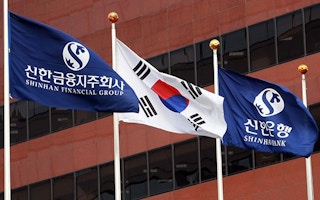Shinhan Financial Group, one of South Korea’s largest banks, has committed to a zero-carbon future with a plan to decarbonise its business activities.
To continue reading, subscribe to Eco‑Business.
There's something for everyone. We offer a range of subscription plans.
- Access our stories and receive our Insights Weekly newsletter with the free EB Member plan.
- Unlock unlimited access to our content and archive with EB Circle.
- Publish your content with EB Premium.
It is Korea’s first bank to commit to net zero emissions in a frenetic period for corporate climate action in the East Asian country.
The company aims to measure the carbon emissions of the group’s assets, set reduction targets, and reduce its net carbon footprint to zero by expanding loans in renewable energy, according to a report in Korean newspaper ChosenBiz.
The bank said its commitment goes further than recent pledges made by competitors to stop financing coal. Last month, KB Finance became the first Korean bank to suspend investments and loans in coal projects.
A company spokesperson told Eco-Business that while the details of the commitment were still being finalised, the pledge would most likely rule out new coal financing, and honour existing coal contracts.
The company said that a timeframe for carbon neutrality was still being worked out, but that net zero emissions could be achieved in 3-5 years.
Though Shinhan will continue to finance the coal projects it is involved in, the spokesperson said that the bank’s investments in renewables would offset the emissions from coal investments.
Dr Helena Wright, vice-president of Asia Sustainable Finance at conservation group the World Wide Fund for Nature, said it was “highly encouraging” to see financial institutions in Asia moving towards net-zero commitments, but said she hoped to learn more about how the bank’s plans aligned with the Paris Agreement on climate change.
“With the COP26 climate change conference coming up next year, more financial institutions - as well as countries - are making commitments to a net zero future. These commitments are needed to avoid the worst impacts of climate change - which is especially important since Asia is particularly vulnerable to climate risks,” she said.
Shinhan Financial, which claims to be the first bank in Korea to publish a sustainability report, has pledged to invest 20 trillion won (US$17.5 billion) in the green sector by 2030, and this year appointed a chief sustainability officer and a sustainability management council for the first time to steer the bank’s environmental, social and governance strategy.
The news emerged from a board meeting earlier this month, and comes eight months after Korea’s government declared its ambition to achieve net zero carbon emissions by 2050 as part of a ‘Green New Deal’.
The government’s ambitions includes a target of 40 per cent renewable power in the country’s coal-heavy energy mix by 2034, which has provided banks with an added incentive to pursue deals in clean energy.








